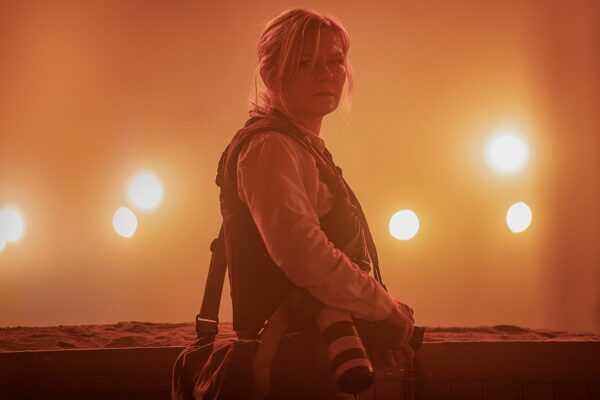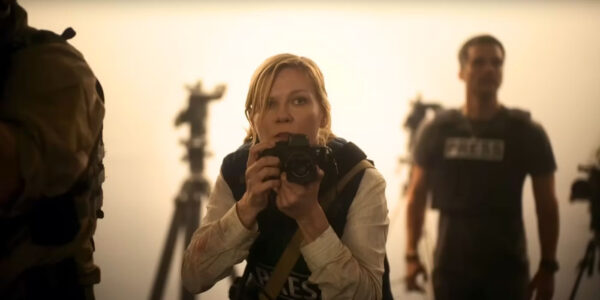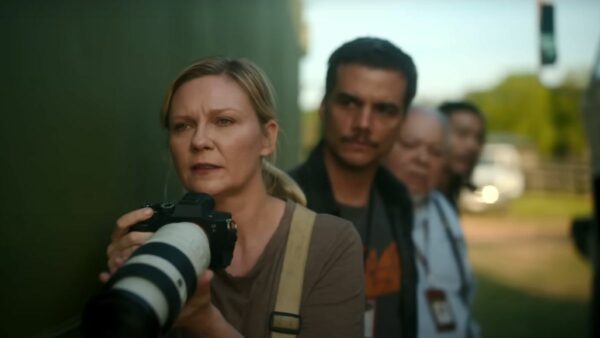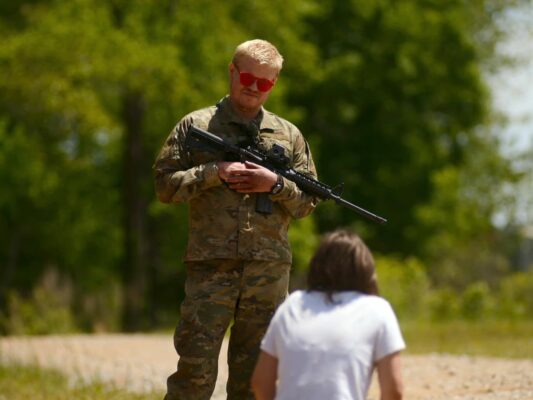
Writer/director Alex Garland returns for his fourth feature, Civil War, which focuses on American journalists caught in the middle of a domestic war.
In the weeks leading up to the release of Civil War, there was plenty of online chatter about whether it was “appropriate” to release such a contentious film in the middle of an election year. The reality of Garland’s film is that it doesn’t so much stoke the political fire that divides Americans, as much as it reinforces the futility of conflict and the cost it inflicts on our humanity.
The film opens on the President of the United States (Nick Offerman) – now in his third term – workshopping a speech in which he declares victory over the rebelling states of Texas and California. The details of how and when the titular civil war began are unclear (and never fully elaborated on), but the specifics aren’t actually important to the narrative. This may seem like a cop-out, but Garland’s narrative is much more interested on the impact of violence as opposed to the politics that incites it.
Civil War follows four main characters: hardened war photojournalist Lee Smith (Kirsten Dunst) and her slightly glib and childish writing partner Joel (Wagner Moura), as well as Lee’s aging mentor Sammy (Stephen McKinley Henderson), and aspiring photojournalist Jessie (Cailee Spaeny).
Jessie is prone to rushing head first into situations because she is young, inexperienced, and believes that the power of the press will protect her from harm. Early on, Lee expertly saves Jessie from a suicide bombing in New York, an experience that leaves the young girl shaken, but even more determined to persevere.
By contrast, the event has virtually no effect on Lee. She shrugs it off like it’s just another day in the office.
As the film progresses, however, Garland’s screenplay peels back Lee, Joel and Sammy’s protective layers, exposing the coping mechanisms that have allowed them to survive in perpetual war zones, while simultaneously damaging or destroying their humanity.
Naturally they all seem ok on the surface, but in time it becomes clear that they’re simply hiding behind the guise of journalistic objectivity. Lee isn’t really desensitized to the violent horrors she photographs, just as Joel’s juvenile quips and glib behaviour are offset by his black-out drinking. Meanwhile, Sammy’s age, weight, and race are in conflict with his desperate need to stay in the game and remain relevant.

Unsurprisingly, the film has a pretty cynical point of view about humanity and, to a lesser degree, the current state of journalism. While we learn (some of) the outlets that they’re reporting for, the film is fast and loose with the logistics and the infrastructure. At one point the journalists all stay at a hotel experiencing brown-outs and Lee comments on the slow upload speed of the internet; and while the news is still televised, it appears that cell phones have been rendered obsolete.
The film employs a ticking clock premise – that the White House will fall and the President will be executed – as narrative justification to make an urgent and dangerous road trip to DC. Along the way there are various stop and incidents that explore not just the state of the nation, but also delve into how each member of the group is coping.
One deeply ironic stop involves a town that is seemingly untouched by violence. Everywhere else shows signs of devastation: bodies hang from overpasses and gas stations; malls and homes are destroyed; and abandoned cars litter the freeway. But one small town features none of this, which prompts Joel to question a local dress shop owner if they know about the larger conflict. In response, the woman nonchalantly acknowledges that they know that war is happening, but they refuse to get involved.
It’s a damning observation from Garland about humankind’s ability to disengage emotionally and politically, even when the conflict is on our own doorstep. To hammer home the delusional hypocrisy of the woman’s statement, immediately upon exiting the store, the group spots armed men patrolling the town’s rooftops.

Civil War is not a subtle film. It is deliberately confrontational and in your face, repeatedly throwing its characters into the literal line of fire to elicit a reaction. This includes sequences of graphic murder and its gory aftermath, in addition to countless shoot-outs. It’s all in service of exposing the horrors of mankind and the impact of violence – both physical and mental – on society.
Despite the foursome’s claims of distance and objectivity, the subject dominates nearly every conversation. This includes the suggestion that it’s harder to remain objective when the conflict is on American soil.
The exchanges between Lee and Jessie carry the greatest weight because Lee is the embodiment of Jessie’s future if she pursues her career. Dunst is exceptional in a surprisingly restrained performance: Lee’s refusal to react initially makes her inscrutable, but as the film progresses, the cracks appear in her facade.
Spaeny is tasked with arguably the film’s most frustrating character: the role demands an impulsive, devil-may-care attitude that frequently puts the other characters in danger, and – in the process – tests the audience’s ability to empathize with Jessie.
And then there’s Joel. Lee’s longterm (platonic) partner doesn’t pretend that he’s ok; in fact, he arguably wears his sexual and alcoholic vices on his sleeve. Like Dunst, Moura isn’t putting on a showy performance; instead the Brazilian actor finds the right balance between cocky, driven, and wounded. In another genre, Joel would be the romantic heartthrob: a hot bad boy who isn’t really all that bad (Real talk, though: Moura is making jeans and a t-shirt look so damn sexy).

Even if audiences struggle with the film’s politics or Garland’s confronting approach to depicting violence, Civil War is undeniably affecting. Cinematographer Rob Hardy employs hand held cameras to immerse us in the action, which makes for some incredibly visceral set pieces. Even though the violence and gore eventually takes on a numbing effect, Garland changes up the style and framing of his set pieces so that the NY protest plays different from Jessie’s first taste of war, which is itself different from the White House finale, etc.
One of the most notable sequences features Dunst’s husband, Jesse Plemons, as an unnamed soldier who takes the group hostage near a mass grave. The “what kind of American are you?” exchange has been heavily featured in the film’s advertising, but the line carries a great deal more power in the film. This is one of Civil War‘s tensest moments, in large part because the way that Plemons and his men dispense violence is so unpredictable and arbitrary. Only they know the correct answers to their questions and one wrong move means death.
Adding to the film’s visceral impact is its pulse-pounding sound design, which feels cranked up to eleven. The result is that gunshots and explosions play like jump scares.
Civil War is immersive and challenging. It’s a film that’s determined to get a rise out of its audience. This is, of course, exactly what Garland wants: on his press tour, he has repeatedly expressed his desire to initiate a dialogue – about politics, about violence, and about responsibility. Considering the film has already garnered polarizing reactions from critics, Civil War seems well positioned to spark debate.
Regardless of its ability to inspire discourse, however, this much is certain: Civil War is undeniably tense, visceral, and affecting. Love it or hate it, audiences will feel something when the credits roll…even if it is just numb. 4/5
Civil War is in theaters April 11